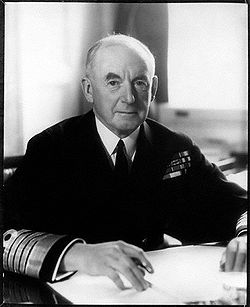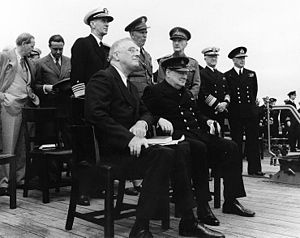- Dudley Pound
-
Sir Dudley Pound 
Admiral of the Fleet Sir Dudley PoundBorn 29 August 1877
Isle of WightDied 21 October 1943 (aged 66) Allegiance  United Kingdom
United KingdomService/branch  Royal Navy
Royal NavyYears of service 1891-1943 Rank Admiral of the Fleet Commands held Mediterranean Fleet Battles/wars World War I
Arab revolt in Palestine
World War IIAwards Knight Grand Cross of the Order of the Bath
Order of Merit
Knight Grand Cross of the Royal Victorian OrderAdmiral of the Fleet Sir Alfred Dudley Pickman Rogers Pound GCB OM GCVO RN (29 August 1877 – 21 October 1943) was a British naval officer who served as First Sea Lord, professional head of the Royal Navy from June 1939 to September 1943.
Contents
Early life
Pound was born on the Isle of Wight. His father was an Eton-educated[1] barrister and his mother was an American from Boston.[2] Pound was descended from Dudley Leavitt Pickman,[3] an early Salem, Massachusetts merchant, on his mother's side.[4] She and Pound had a strained relationship.
In 1891, Pound entered the navy as a cadet. He advanced rapidly, and by 1916 was a captain in command of the battleship HMS Colossus.[5] He led her at the Battle of Jutland with notable success, sinking two German cruisers, beating off two destroyers and eluding five torpedoes.
Interwar career
Pound was posted to naval planning after the war, becoming director of the planning division in 1922.[5] During Roger Keyes' time as commander-in-chief of the Mediterranean Fleet in the late 1920s, Pound was his chief of staff.[5] Pound became Commander of the Battle Cruiser Squadron in 1929 and Second Sea Lord and Chief of Naval Personnel in 1932.[5] He became Chief of Staff of the Mediterranean Fleet in 1935 and then Commander-in-Chief, Mediterranean Fleet in 1936, serving until 1939.[5]
First Sea Lord
On July 31, 1939, Sir Dudley Pound was appointed First Sea Lord. His health was doubtful even at this time, but other experienced admirals were in even poorer health. A naval medical officer was aware of an incipient brain tumour, but did not inform the Admiralty about it. Pound also suffered from hip degeneration, which kept him from sleeping, causing him to doze off at meetings.[6]
There are sharply divided opinions of Pound from this time. His staff at the Admiralty found him easy to work with. However admirals and captains at sea accused him of "back seat driving" and other errors, and he had some serious clashes with Admiral John Tovey, the commander of the Home Fleet.[6] Winston Churchill, with whom he worked from September 1939, found him fairly easy to dominate. However, he has been described as a "cunning old badger" who had used guile to frustrate Churchill's dramatic idea of sending a battle fleet into the Baltic early in the War.[7]
Perhaps Pound's greatest achievement was his successful campaign against German U-boat activity and the winning of the Battle of the Atlantic (1939–1945). His most criticized decision was ordering the dispersal of Arctic Convoy PQ-17.
In July 1943 Pound's wife died; by this time it was clear that his health was declining, and after suffering two strokes he resigned formally on 5 October 1943.
"The next day, the King's Private Secretary (Sir Alan Lascelles) called at the Royal Masonic Hospital and gave the dying admiral the insignia of the Order of Merit."[8]
Pound had been appointed to the Order of Merit on 3 September 1943, the fourth anniversary of the outbreak of the war.[8]
Pound died on 21 October 1943 and after a funeral in Westminster Abbey, his ashes and those of his wife were scattered at sea.
Screen portrayals
Admiral Pound was featured in the 2009 Home Box Office presentation of Into the Storm portraying Winston Churchill's service as Prime Minister. Pound was played by English actor Michael Hadley.
Notes
- ^ The Eton Register, Part III: 1862-1868, Eton College, Old Etonian Association, Spottiswoode & Co., Ltd., Eton, 1906
- ^ Royal Navy's Test, TIME magazine, April 22, 1940
- ^ History of Essex County, Massachusetts, Duane Hamilton Hurd, Printed by J. W. Lewis & Co., Philadelphia, Pa., 1887
- ^ Dudley Pound's mother Elizabeth Pickman Rogers came from an "old Massachusetts seafaring family," notes Robin Brodhurst in his book Churchill's Anchor.[1] Elizabeth Pickman Rogers, born in 1853, was the daughter of Richard Saltonstall Rogers [2] and his wife Elizabeth Leavitt Pickman, who was the daughter of Dudley Leavitt Pickman and Catherine Saunders.[3] Dudley Pound's mother Elizabeth married his father in a ceremony at Grace Church in Salem, Massachusetts, on July 18, 1878.[4] But Pound's mother Elizabeth's "kleptomania and excessive borrowing destroyed her marriage and poisoned her own image in the memory of her son," notes author Robin Brodhurst. "Her profligacy also meant that Dudley would throughout his life be wholly dependent on his navy pay for an income which itself was subject to the vicissitudes of the tight budgets of the inter-war years. After his retirement Admiral of the Fleet Pound declined Churchill’s offer of a peerage in the belief that his family could not support such a position financially."[5]
- ^ a b c d e Liddell Hart Centre for Military Archives
- ^ a b Ludovic Kennedy: Pursuit: The Sinking of the Bismarck
- ^ BBC Radio 4 programme on Churchill and Operation Catherine, 27 September 2001, quoted by Martin, Stanley, The Order of Merit, I.B. Tauris & Co. Ltd., London, 2007, p. 90
- ^ a b Martin, Stanley, The Order of Merit, I.B. Tauris & Co. Ltd., London, 2007, p. 91
References
- Stephen Roskill: Churchill and the Admirals
- Stephen Roskill: The War at Sea (UK Official History)
- Stephen Roskill Naval Policy Between the Wars
- Corelli Barnett: Engage the Enemy More Closely
- Malcolm H. Murfett: The First Sea Lords from Fisher to Mountbatten
- Heathcote, T. A. (2002). The British Admirals of the Fleet 1734 - 1995. Pen & Sword Ltd. ISBN 0-85052-835-6
- Career history
Military offices Preceded by
Sir Cyril FullerSecond Sea Lord
1932–1935Succeeded by
Sir Martin Dunbar-NasmithPreceded by
Sir William FisherCommander-in-Chief, Mediterranean Fleet
1936–1939Succeeded by
Sir Andrew CunninghamPreceded by
Sir Roger BackhouseFirst Sea Lord
1939–1943Succeeded by
Sir Andrew CunninghamHonorary titles Preceded by
Hon. Sir Reginald DraxFirst and Principal Naval Aide-de-Camp
1941–1943Succeeded by
Sir Percy NobleAdmirals of the Fleet Lord Cork · Sir Andrew Cunningham · Sir Charles Forbes · Sir Dudley Pound · Sir James Somerville · Sir John ToveyField Marshals Marshals of the Royal Air Force Categories:- First Sea Lords
- Lords of the Admiralty
- Royal Navy admirals of the fleet
- Royal Navy World War II admirals
- People from the Isle of Wight
- Dudley–Winthrop family
- 1877 births
- 1943 deaths
- Royal Navy officers of World War I
Wikimedia Foundation. 2010.

